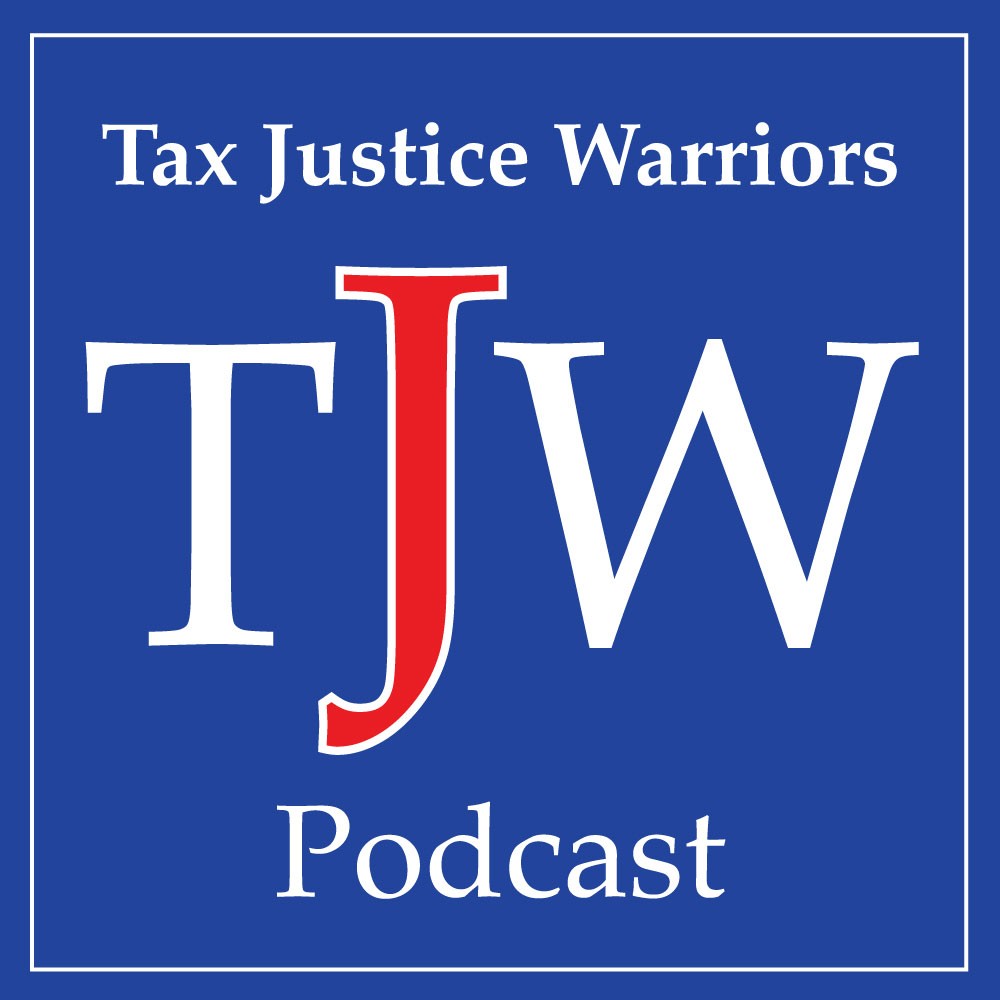
17.6K
Downloads
212
Episodes
Tax Justice Warriors is a podcast that focuses on tax controversy, Low Income Taxpayer Clincs (LITCs), educating the public, news, and interviews about taxes. The host is Omeed Firouzi, a practice professor and director of the low income taxpayer clinic at Temple University Beasley School of Law. The producer is Zac Harvey.
Tax Justice Warriors is a podcast that focuses on tax controversy, Low Income Taxpayer Clincs (LITCs), educating the public, news, and interviews about taxes. The host is Omeed Firouzi, a practice professor and director of the low income taxpayer clinic at Temple University Beasley School of Law. The producer is Zac Harvey.
Episodes

Friday Apr 23, 2021
Episode 147: IRS Chief Counsel
Friday Apr 23, 2021
Friday Apr 23, 2021
Just what does IRS Chief Counsel do? Well, they represent the IRS as their client. What does that mean? In this episode, I unpack different job items that IRS Chief Counsel does beyond go to U.S. Tax Court.
For example, Chief Counsel advise on different legal matters for other divisions of the IRS. What else do they do? Tune in to learn more.
For finding out all kinds of information on the Office of IRS Chief Counsel, head here:
https://www.jobs.irs.gov/resources/job-descriptions/irs-office-chief-counsel

Friday Apr 16, 2021
Episode 146: Succession Plans
Friday Apr 16, 2021
Friday Apr 16, 2021
In any profession, it is a curve ball when any skilled person is no longer available. This could be due to death, illness, disability, retirement or just plain turnover at the employer.
I looked into succession plans and have some guidance from LITC Administration. There are things to think about when it comes to case review, grant reporting, contacts for outreach and education, and more.

Friday Apr 09, 2021
Episode 145: Sharing Divorce Tax Issues
Friday Apr 09, 2021
Friday Apr 09, 2021
This week, a short episode looking at unexpected tax problems following a divorce.

Friday Apr 02, 2021
Episode 144: The American Rescue Plan
Friday Apr 02, 2021
Friday Apr 02, 2021
The American Rescue Plan was signed into law by President Joe Biden on March 11, 2021. It contains several provisions. Part of the law focuses on tax provisions as well.
In this episode, there is a rundown of top ten items affecting individual tax filers.
1) The third round of stimulus payments (economic impact payments)
2) Earned income tax credit expansion
3) The premium tax credit expansion and partial waiver of repayments
4) Unemployment recipients automatically eligible for the premium tax credit
5) Child tax credit expansion
6) Child and dependent care credit expanded
7) Employer provided dependent care assistance
8) Non-taxable unemployment compensation of $10,200
9) Limits on business losses
10) Potential student loan forgiveness non-taxable
Tune in to learn more!

Friday Mar 26, 2021
Episode 143: The LITC Grant
Friday Mar 26, 2021
Friday Mar 26, 2021

Friday Mar 19, 2021
Episode 142: The Changing Tax Season
Friday Mar 19, 2021
Friday Mar 19, 2021
The tax season keeps changing. The IRS announced that the tax filing deadline for federal individual income tax returns are due on May 17. That does not affect corporate taxes or quarterly estimated tax payments. Will it affect your state tax filing – check with your state’s tax agency.
How will the changes affect tax filing? I talk through some effects that might occur for tax preparers and the IRS. However it goes for you, I hope your tax season is wonderful.

Friday Mar 12, 2021
Episode 141: The Child Tax Credit, Continued
Friday Mar 12, 2021
Friday Mar 12, 2021
The American Rescue Plan has now been signed into law. It includes an expansion of the child tax credit for 2021. That plan expands the age for qualifying children to include 17-year-olds. It increases the credit to $3,000 per child for many families (with $3,600 being the amount for children under age 6). The $2,500 earnings floor is removed and the credit will be fully refundable. Finally, half of the credit will be paid in advance by the IRS making monthly payments to families from July to December 2021.
In this episode, I touch on the child tax credit expansion and discuss the IRS role in distributing those payments of the credit in 2021. The child tax credit and the earned income credit are times that the IRS is in the role of benefits distributor. That is a change for the IRS from compliance enforcement. I look at the dichotomy as the IRS faces their pivot from one role to another. What will their approach be for the future?
Note: As of the recording, the American Rescue Plan had not passed into law yet.

Friday Mar 05, 2021
Episode 140: Recent Tax Recap
Friday Mar 05, 2021
Friday Mar 05, 2021
This episode provides a roundup of recent tax events and other issues. To begin with, the American Bar Association Midyear Tax Meeting was virtual. I provide highlights regarding the Individual & Family Taxation Committee’s focus on the Tax Gap and the Diversity Committee’s focus on inequality in race and taxes. With the IRS, their new electronic system to upload power of attorney forms seems to be working faster than faxing (2 weeks processing time vs. 2 months). On a personal note, I provide updates regarding teaching this semester, a Tax Court case trial this month and writing for Procedurally Taxing.

Friday Feb 26, 2021
Episode 139: Highlights for the Tax Season
Friday Feb 26, 2021
Friday Feb 26, 2021
This is a short episode to provide some highlights on the 2020 tax return that not everyone may be aware of. While I covered some of these items in past episodes, I thought the highlights would be worth mentioning again.
Basically:
-
the recovery rebate credit is one way taxpayers may get their economic impact (stimulus) payments through filing a tax return, but they may not get as much as they expect
-
the earned income credit has a lookback to compare 2020 income and 2019 income to take the most advantageous for the credit
-
there is legislation pending that may increase the child tax credit next tax season
-
a reminder that unemployment income is taxable income
Tune it to learn more details!

Friday Feb 19, 2021
Episode 138: Tax Court Return
Friday Feb 19, 2021
Friday Feb 19, 2021
This episode details the return of the U.S. Tax Court for hearings in Kansas City, Missouri, and Wichita, Kansas in February 2021. Tune in to hear about remote proceedings, feedback on the Tax Court upgrade to the DAWSON system, and remote calendar calls.
